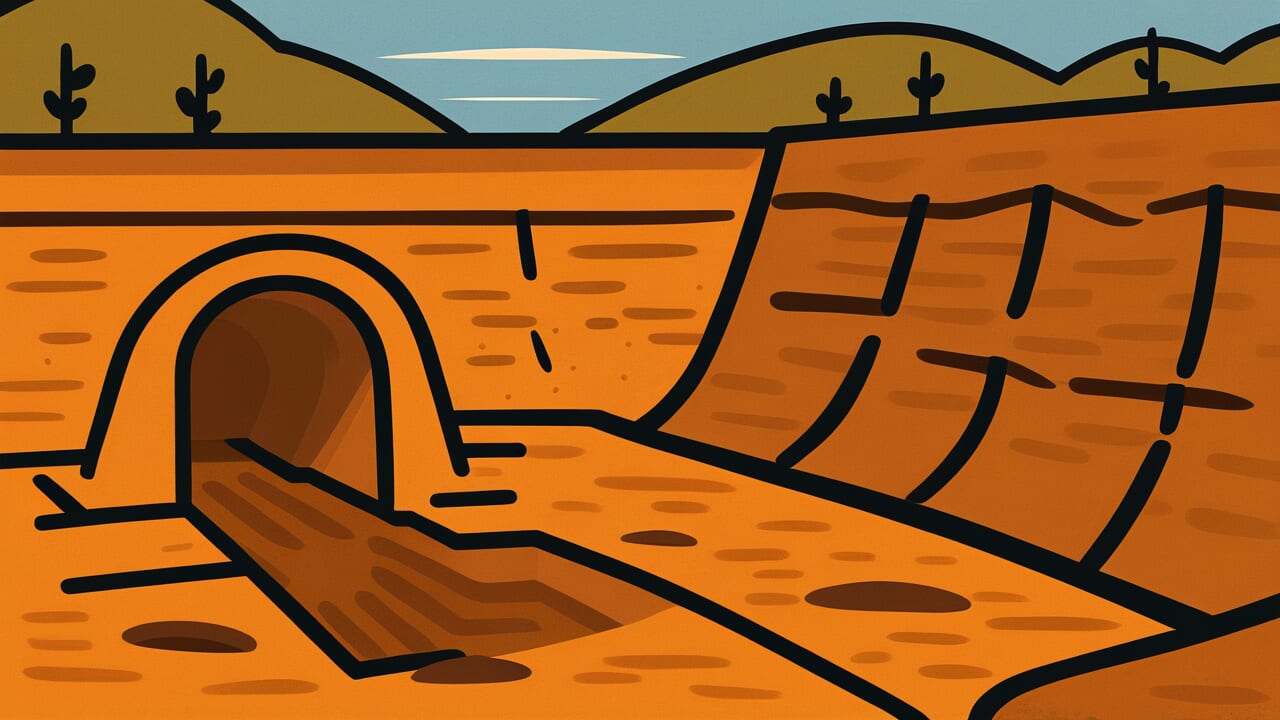How to Read “Even a dike collapses from an ant’s hole”
Ari no ana kara tsutsumi mo kuzureru
Meaning of “Even a dike collapses from an ant’s hole”
“Even a dike collapses from an ant’s hole” means that even the smallest flaw or carelessness can eventually lead to major disaster or failure if left unattended.
A tiny hole made by an ant seems insignificant. But water seeps through that hole and eventually triggers the collapse of the entire dike.
This proverb warns us not to dismiss minor problems. A small mistake at work, a slight lack of consideration in relationships, or pushing yourself a bit too hard with your health.
We often overlook these small cracks, thinking “this much should be fine.” But they can later cause situations beyond repair.
Even in modern society, most corporate scandals and major accidents begin with overlooked small problems in their early stages.
Origin and Etymology
The most widely accepted theory traces this proverb to an ancient Chinese text called “Han Feizi.”
Han Feizi is a book on Legalist philosophy from around the 3rd century BCE. It contains a passage that says “Even a thousand-zhang dike collapses from the hole of a mole cricket or ant.”
This teaching came to Japan and evolved to use the more familiar word “ant.” Japan has long been an agricultural nation centered on rice paddy cultivation.
Managing dikes was a matter of village survival. If a small water leak was ignored, the entire dike would eventually collapse and flood the fields.
Such experiences deeply embedded this proverb in the Japanese heart.
People who actually managed dikes never overlooked small abnormalities like ant nests. They inspected and repaired them regularly.
This proverb contains wisdom based on our ancestors’ real experiences.
Interesting Facts
In dike management, ant nests have actually been considered a serious threat. Ants build complex nests deep underground.
They may be hollowing out the dike’s soil in areas invisible from the surface. Even in modern civil engineering, checking for ant nests is an important inspection point for dikes.
This proverb reflects actual danger, not just metaphor.
Flood control technical books from the Edo period contain instructions to “immediately fill any ant holes found.”
People of that era knew from experience that small holes could lead to major disasters.
Usage Examples
- I thought it was just a light cold and kept pushing myself, but even a dike collapses from an ant’s hole—I ended up hospitalized
- Even minor expense fraud follows the principle that even a dike collapses from an ant’s hole, so let’s report it properly
Universal Wisdom
“Even a dike collapses from an ant’s hole” has been passed down through generations because humans have an inherent tendency to dismiss small problems.
We react sensitively to major threats right in front of us. But we become surprisingly insensitive to minor abnormalities.
This may have been an adaptation to concentrate our limited attention on serious crises as a survival instinct.
However, this very psychological trait often leads us to major failures. Small compromises like “just for today” or “this much is fine” accumulate.
By the time we notice, the situation has become irreparable. The same pattern repeats in relationships, health, and work.
This proverb reveals a truth: the path to ruin begins not with a dramatic blow, but with overlooked small cracks.
Our ancestors understood the limits of human attention and the pitfalls we easily fall into. That’s why they conveyed the lesson “cherish small things” through striking metaphor to future generations.
This wisdom holds even greater meaning in our modern age that pursues convenience and efficiency.
When AI Hears This
In materials engineering, we can express with equations how small cracks destroy entire structures.
For example, when you scratch glass, force concentrates there and becomes many times stronger. This “stress concentration” intensifies as the crack tip’s radius of curvature decreases.
Theoretically, it approaches infinity. Even a tiny flaw like an ant’s hole experiences forces tens to hundreds of times greater than those on the entire dike.
Even more interesting is crack growth rate. In fracture mechanics, there’s a law called “Paris’s law.”
Cracks initially progress slowly, but once they exceed a critical size, they grow exponentially. Specifically, when crack length doubles, propagation speed increases four to eight times.
This is an exponential growth pattern. It explains why things progress invisibly slowly at first, but become too late once noticed.
Even in actual bridges and dams, water penetrates through small surface cracks. Repeated freezing and thawing causes internal cracks to propagate.
Inspections never overlook microscopic cracks because they become starting points for failure. Ancient people knew from experience that “small holes cause major collapse.”
Modern science can now predict this mechanism using numerical values called stress intensity factors.
Lessons for Today
This proverb teaches us that the accumulation of small daily choices shapes our lives. A casual comment on social media, a minor abnormal value in a health checkup, a slight lack of consideration toward your partner.
These may seem “fine for now,” but if left unattended, they can lead to major regrets.
The important thing isn’t aiming for perfection. It’s developing the habit of addressing small cracks when you notice them, rather than thinking “whatever” and letting them slide.
Apologize honestly when you should. Check things when you feel something’s off. Don’t dismiss changes in your physical condition.
This accumulation of small acts of integrity protects the dike that is your life.
When problems are small, repairs are easy. But rebuilding a collapsed dike requires enormous time and effort.
Your small awareness and actions today create tomorrow’s great peace of mind.



Comments